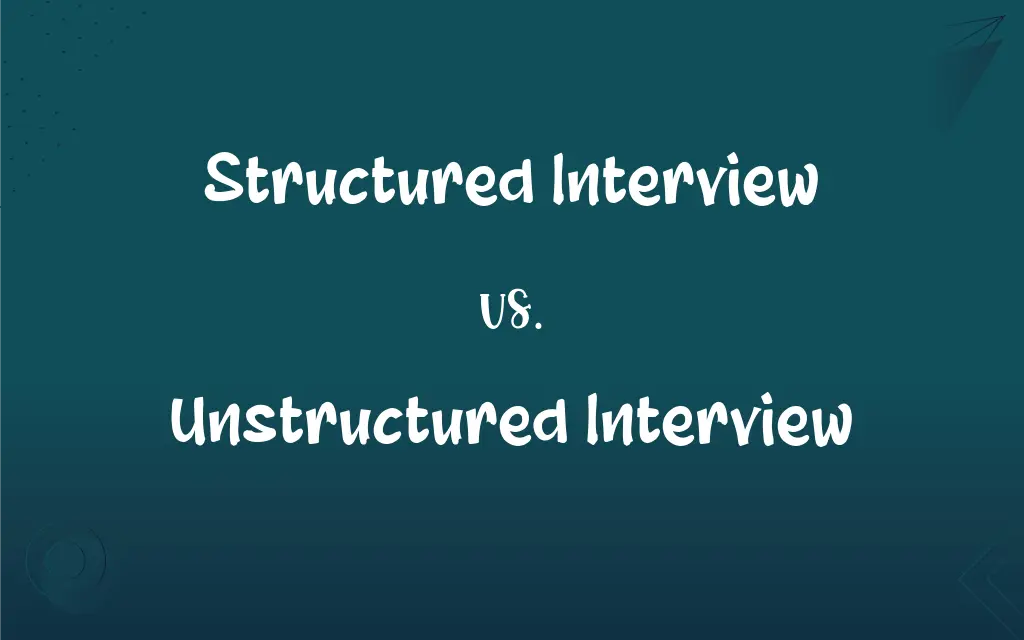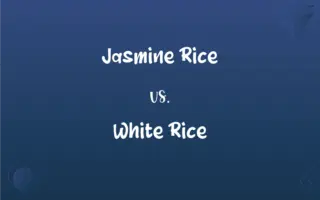Structured Interview vs. Unstructured Interview: What's the Difference?
Edited by Janet White || By Harlon Moss || Updated on October 10, 2023
A structured interview follows a consistent format with predetermined questions, while an unstructured interview is more open-ended and adaptable.

Key Differences
In the realm of hiring and research, the structured interview and unstructured interview methods are both valuable, albeit for different reasons. A structured interview adheres to a fixed set of questions, ensuring each candidate or subject is assessed in the same manner. Conversely, an unstructured interview offers more flexibility, allowing for impromptu questions based on the conversation flow.
During a structured interview, the interviewer has a specific agenda and checklist, with little deviation from the set script. This format ensures consistency and reduces biases, making comparisons easier. On the other hand, an unstructured interview can evolve naturally, resembling a casual conversation, and potentially uncovering deeper insights or personal nuances.
While structured interviews are systematic and can be scored quantitatively, they might miss out on spontaneous information or not delve into specific areas in depth. In contrast, unstructured interviews, although richer in detail and adaptability, may introduce interviewer biases and make objective comparisons challenging.
The choice between a structured interview and an unstructured interview often depends on the goal. If the aim is to maintain uniformity and collect comparable data, structured is preferred. If the objective is to explore in-depth and foster a relaxed environment where the interviewee might share more, unstructured becomes the go-to method.
Both the structured interview and unstructured interview techniques have their strengths and weaknesses. While structured can seem impersonal and rigid, it's valuable for its objectivity. While unstructured can appear inconsistent, it's cherished for its depth and adaptability.
ADVERTISEMENT
Comparison Chart
Format
Predetermined and consistent
Flexible and adaptable
Questions
Fixed set
Open-ended and can change
Objectivity vs. Depth
High objectivity, might lack depth
Rich in detail, potential for bias
Comparison Between Interviewees
Easier due to uniformity
Challenging due to varied responses
Interaction Style
Formal and systematic
Casual and conversational
ADVERTISEMENT
Structured Interview and Unstructured Interview Definitions
Structured Interview
An interview with little to no deviation from its script.
The structured interview left no room for off-topic discussions.
Unstructured Interview
A conversational approach to interviewing without a fixed format.
The therapist's unstructured interview helped the patient open up more.
Structured Interview
A systematic approach to interviewing with predetermined queries.
Researchers prefer the structured interview for its replicability across subjects.
Unstructured Interview
A flexible interview method adapting to the interviewee's responses.
The journalist conducted an unstructured interview to delve deeper into the subject's experiences.
Structured Interview
A standardized interview method with set questions.
The HR department uses a structured interview format to ensure fairness among candidates.
Unstructured Interview
An interview technique focusing on depth and adaptability.
For the documentary, the director chose an unstructured interview style to capture authentic emotions.
Structured Interview
An interview method aiming for objective data collection.
To eliminate biases, the team opted for a structured interview.
Unstructured Interview
An interview without set questions, evolving based on the conversation.
The unstructured interview with the artist felt more like a chat over coffee.
Structured Interview
An interview technique that maintains consistency.
During the structured interview, all interviewees were asked the same questions.
Unstructured Interview
An interview that allows for spontaneous and open-ended questions.
The unstructured interview revealed insights not found in standard questionnaires.
FAQs
Why choose a structured interview?
For uniformity, comparability of responses, and reducing biases.
What is a structured interview?
A structured interview is a standardized method with predetermined questions ensuring consistency.
How does an unstructured interview differ?
An unstructured interview is flexible and evolves based on the conversation without set questions.
Can unstructured interviews introduce bias?
Yes, they can, as the lack of a set format might lead to interviewer biases.
Can structured interviews feel impersonal?
Yes, they might, due to their rigid and consistent format.
Are structured interviews quantitative?
They can be, especially when responses are scored or ranked.
Which interview type is more objective?
Structured interviews are more objective due to their consistent format.
Do unstructured interviews allow for off-topic discussions?
Yes, they provide room for spontaneous and open-ended conversations.
Which interview style is quicker?
Structured interviews, generally, as they follow a set script.
How can biases be reduced in unstructured interviews?
Interviewer training and awareness are key.
When is an unstructured interview preferred?
When seeking depth, adaptability, and a more relaxed conversation.
Are unstructured interviews qualitative?
Typically, yes, as they focus on depth and rich details.
Which is better for research?
Both can be valuable: structured for consistency and unstructured for depth.
Can structured interviews be used in therapy?
Yes, though therapists might lean more towards unstructured or semi-structured methods.
Are structured interviews better for large-scale hiring?
Often, yes, due to their consistency and efficiency.
Can unstructured interviews be used in journalism?
Absolutely, they can lead to in-depth and insightful stories.
Can I mix both interview types?
Yes, a semi-structured interview combines elements of both.
What's a downside of structured interviews?
They might miss out on spontaneous insights.
Can unstructured interviews be replicated?
They're harder to replicate due to their adaptive nature.
Is one method superior to the other?
No, the choice depends on the goal of the interview.
About Author
Written by
Harlon MossHarlon is a seasoned quality moderator and accomplished content writer for Difference Wiki. An alumnus of the prestigious University of California, he earned his degree in Computer Science. Leveraging his academic background, Harlon brings a meticulous and informed perspective to his work, ensuring content accuracy and excellence.
Edited by
Janet WhiteJanet White has been an esteemed writer and blogger for Difference Wiki. Holding a Master's degree in Science and Medical Journalism from the prestigious Boston University, she has consistently demonstrated her expertise and passion for her field. When she's not immersed in her work, Janet relishes her time exercising, delving into a good book, and cherishing moments with friends and family.































































